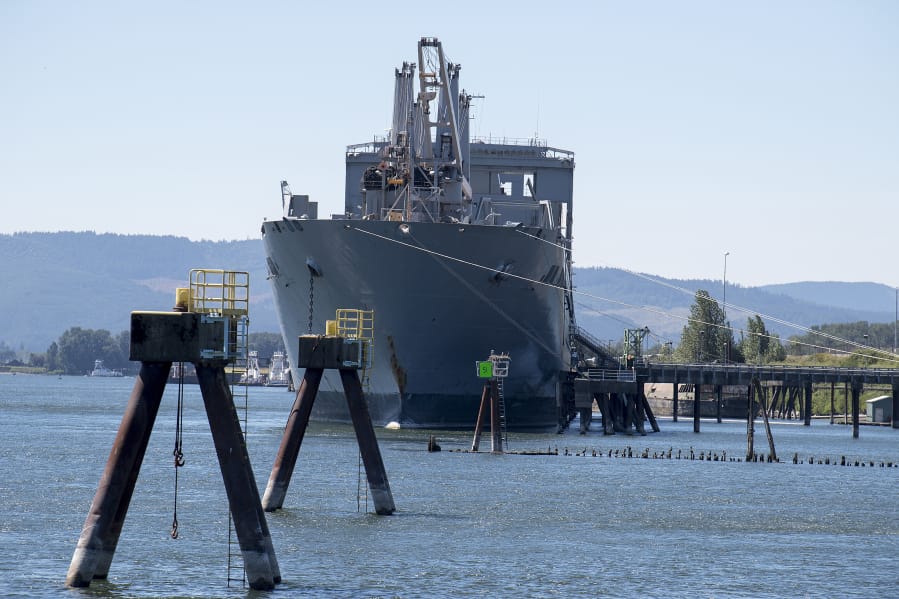At the Port of Vancouver, workers load and unload cargo, trucks cycle in and out, and cargo ships bound for Southeast Asia sit idly at the docks. Nestled quietly among it all is a colossal U.S. naval ship.
On Wednesday, the Port of Vancouver welcomed the USNS Brittin, a large, medium-speed roll-on/roll-off, or LMSR, vehicle cargo ship. The ship, which is mostly used for transporting military vehicles and supplies, will be docked in Vancouver for about 90 days as it undergoes annual maintenance and inspection required by the American Bureau of Shipping and the U.S. Coast Guard.
The Brittin is one of 11 LMSR ships operated by a subsidiary of Maersk Shipping Company and under contract with the Navy Military Sealift Command. The Command operates about 125 civilian-crewed ships that offer logistical support to U.S. Navy ships worldwide. That includes specialized missions, strategic pre-positioning of combat cargo at sea and moving military cargo and supplies.
With four cranes and several ramps, the Brittin is ideal for moving oversized cargo and the rapid loading and off-loading of military vehicles.
Alex Strogen, chief commercial officer for the Port of Vancouver, said these kinds of ships are the workhorses of the Navy. The last time a ship of this magnitude docked in Vancouver was 10 years ago.
“If you were to cut it in half, this ship would look a lot like a parking garage with just deck after deck of space,” Strogen said.
At 951 feet in length and with a carrying capacity over 28,500 tons, the Brittin is a behemoth of a ship. If it stood on its stern, it would stand as tall as six of downtown Vancouver’s Smith Towers, stacked. It could also carry the weight of 142 blue whales, the world’s largest mammal.
Strogen said Vancouver is an ideal location for the Brittin. Its close proximity to Portland International Airport makes it easy to transport any repair supplies that need to be flown in, and the freshwaters of the Columbia River are not as corrosive as ocean salt water, he said.
The crew of nearly 30 will stay in Vancouver for the next 3 months, he said.
Strogen said the port is honored to host and support the ship, and that this visit will have positive economic impacts for the Vancouver community. Crew members will visit local shops, and some of the maintenance work will be contracted to Vancouver businesses. Also, like any other ship, the Brittin pays dockage to stay at the port.
The port declined to tell The Columbian the dockage fee amounts “to protect the privacy of our customers,” said Therese Lang, director of communications for the Port of Vancouver.
Prior to its arrival in Vancouver, the Brittin spent six months deployed in the Persian Gulf, Strogen said.
In 2017, it was deployed to provide support for hurricane relief efforts in Puerto Rico. Instead of military cargo and large tanks, the ship was loaded with portable generators, water purification equipment and other much needed supplies.
The Port of Vancouver is not open to visitors to see the ship, but the Brittin is visible from the Oregon side of the Columbia River and to boaters or kayakers passing the port on the water.
The naval ship is not the usual port visitor. The Port of Vancouver is used to handling large ships transporting imported cars, components for wind energy such as turbine blades and a large amount of grain.
Zack Merrill, sales account manager for the Port of Vancouver, said 15 percent of the nation’s grain comes through the port every year.
“On average, the acreage of wheat collected that goes out is bigger than Yosemite, Yellowstone and Olympic National Parks combined,” Merrill said.
Strogen said the Port of Vancouver is the gateway to global trade for several states, including Nevada, Idaho and Washington.
“This is where we meet the world,” Strogen said, arms extended wide to the waters of the Columbia River.




